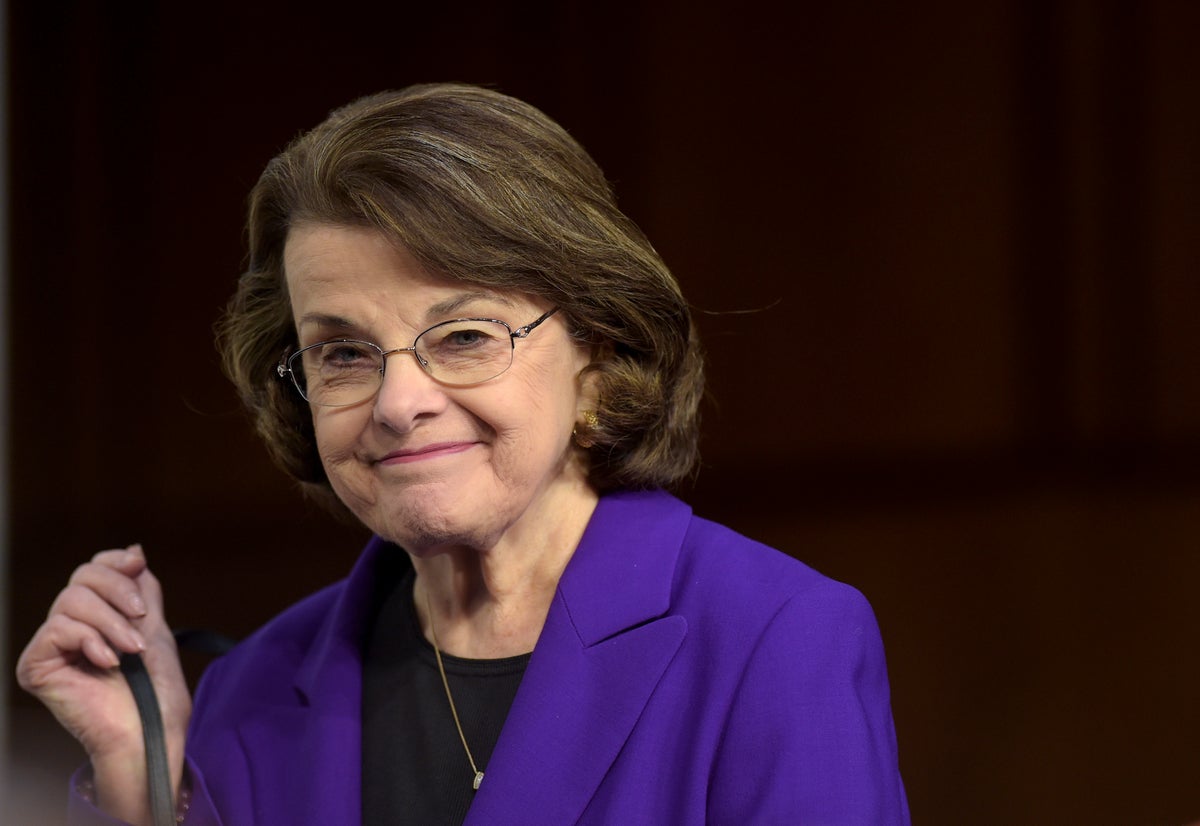
Senator Dianne Feinstein, the trailblazing former mayor of San Francisco who became the first female senator for California, has died at age 90.
Feinstein’s career saw her rise to the highest echelons of government. She became mayor of San Francisco after the assassination of George Moscone in 1978. As a US senator, she authored the 1994 ban on assault weapons. But, as her tenure in the Senate progressed in recent years and months, she faced questions about her declining memory and numerous health complications as she announced she would not seek re-election.
Born in San Francisco in 1933 as Dianne Goldman, Feinstein first won election to the city’s board in 1969, beginning a career that would span more than five decades. She would eventually ascend to being president of the board and during that time, the terrorist group the New World Liberation Front planted and detonated a bomb in front of her home.
On 27 November 1978, fellow member of the board of supervisors Dan White shot and killed fellow supervisor Harvey Milk, the first openly gay elected official in America, and Mayor George Moscone. Ms Feinstein made the announcement to reporters.
“Both Mayor Moscone and Supervisor Harvey Milk have been shot and killed,” she said, which was met with shouts of horror and someone yelling “Jesus Christ.” Feinstein later described her experience of putting her finger through the bullet hole where Mr Milk had been shot.
The moment left an indelible mark on Feinstein. During her time in the Senate, when she authored the ban on assault weapons, the then Sen Larry Craig of Idaho said “the gentlelady from California needs to become a little bit more familiar with firearms and their deadly characteristics.” In response, Feinstein said, “I found my assassinated colleague [Harvey Milk] and put a finger through a bullet hole trying to get a pulse. Senator, I know something about what firearms can do.”
The then San Francisco Mayor Dianne Feinstein and singer Tony Bennett, who sang " I Left My Heart in San Francisco," hangs on to the outside of a cable car in San Francisco before taking a test ride, Wednesday, May 2, 1984— (AP)
Shortly thereafter, Feinstein assumed the mayorship, a role she would hold until 1988. During that time, she led the city through the Aids epidemic that ravaged the city’s community of gay men, and led the city during the 1984 Democratic National Convention.
In 1992, Ms Feinstein would win a special election the same year that Barbara Boxer would win her seat, making California the first state to have two female senators. But the two would have markedly different trajectories. While Ms Boxer would vote against the authorisation of the use of military force in Iraq in 2002, Ms Feinstein supported it.
In the 2020 Democratic primary, Ms Feinstein opted to support Joe Biden rather than Ms Boxer’s successor in the Senate, Kamala Harris, whom Mr Biden would later choose as his running mate.
Feinstein’s more conservative approach was also reflected in her support for the death penalty. In her 1990 failed campaign for governor, she ran an ad highlighting how “she’s the only Democrat for governor who supports the death penalty.”
Ms Feinstein had been struggling with health trouble in recent years— (AP)
In 2004, during the funeral of slain police officer Isaac Espinoza, she criticised Ms Harris – then San Francisco’s district attorney – for not pursuing the death penalty against his killer. In 2018, when running for her last term as senator, she reversed her position on capital punishment and the legalisation of marijuana.
Later in her career, she would often frustrate progressive activists, confronting young climate change activists from the Sunrise Movement in her office in 2019. Similarly, during the confirmation hearing of Supreme Court Justice Amy Coney Barrett, she praised Sen Lindsey Graham (R-SC), the chairman of the committee, saying it was “one of the best set of hearings that I’ve participated in,” before hugging Mr Graham.
Despite this, as chairwoman of the Senate Intelligence Committee, she also pushed for the CIA to declassify the committee’s report on US treatment and torture of detainees after the 9/11 terrorist attacks. She would later call torture a “stain on our values and on our history”.
In her final years, Feinstein faced numerous news reports about her declining memory and health. After the 2020 presidential election, she gave up the top spot on the Senate Judiciary Committee and opted not to become Senate President Pro Tempore, the most senior senator in the majority, earlier this year.
In February, shortly after announcing she would not seek re-election, she would take leave from the Senate after she contracted shingles. In the weeks after her return, she was frequently seen being pushed in a wheelchair.
Feinstein was married three times, first to Jack Berman from 1956 to 1959, before divorcing. The two had one daughter, Katherine. Afterward, she married Bertram Feinstein in 1962 until his death in 1978. Feinstein subsequently married investment banker Richard Blum, until his death in 2022.
Katherine would later assume power of attorney on behalf of her mother as they engaged in a bitter dispute around Mr Blum’s estate and children.
Feinstein was considered a hard-driving boss – once notably saying “I don’t get ulcers, I give them” – who nonetheless focused on work as much as she demanded from her team. Her final vote was earlier this week on advancing a continuing resolution to avoid a government shutdown.







